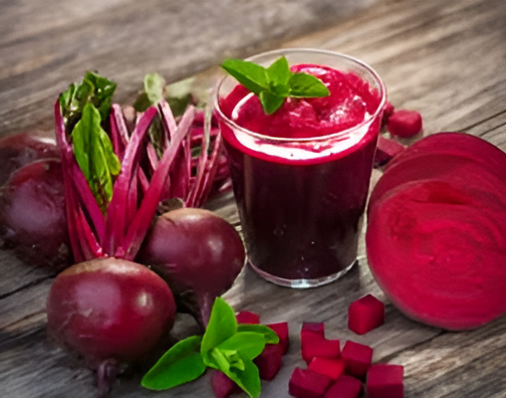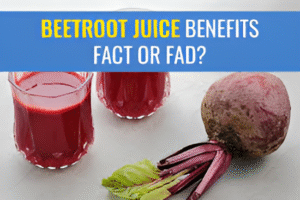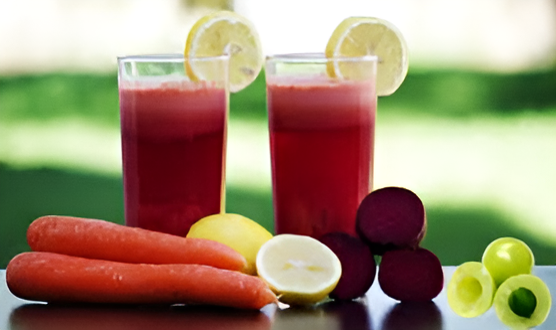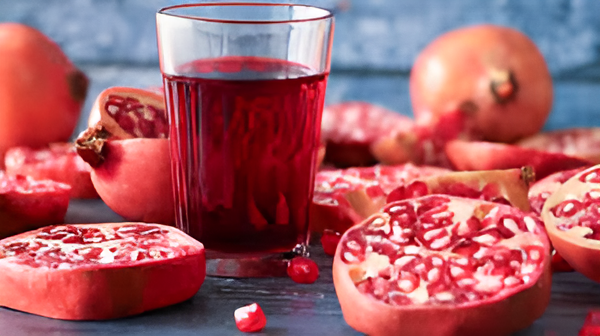
Beet Juice Benefits, made from nutrient- and antioxidant-rich beetroots, is a lively drink with an earthy flavor. Beet juice, recognized for its rich crimson hue and mildly sweet flavor, has gained popularity as a health beverage among athletes, fitness aficionados, and those seeking natural cures. But beyond the hype, what are the actual benefits, and are there any risks to be aware of?

6 Powerful Benefits of Beet Juice:
If you’re looking for a natural source of energy or a drink that’s good for your heart, consider adding beet juice to your diet. Though it provides several health benefits, drinking beet juice also requires certain precautions. We will take a look at the top six advantages of beet juice, along with its nutritional content and possible adverse effects.
History of Beet Juice
For millennia, beets have been utilized for their medicinal properties. The ancient Romans utilized beetroot as a remedy for fevers and constipation. Health tonics were commonly made by fermenting beets in Eastern Europe. Beet juice became popular for cardiovascular health and sports performance only in the 20th century. Nowadays, beet juice is popular for its antioxidant effects and high nitrate content.
Nutritional Profile of Beet Juice (per 240 ml or 1 cup):
- Calories: 100–110
- Carbohydrates: 23g
- Sugars: 9g
- Protein: 2–3g
- Fat: 0g
- Fiber: <1g (less than in whole beets)
- Folate (B9): 20–30% of Daily Value
- Potassium: 13% of Daily Value
- Vitamin C: 8% of Daily Value
- Iron & Magnesium: Trace amounts
- Nitrates: High concentration (natural)
6 Science-Backed Benefits of Beet Juice
1. Lowers Blood Pressure
Beet juice has a high content of dietary nitrates, which transform into nitric oxide in the body. This substance has a relaxing effect on blood vessels, causing them to widen; as a result, blood circulation improves and blood pressure decreases.
Clinical studies have demonstrated that beet juice consumption can lead to a reduction in systolic blood pressure of up to 5–10 mmHg. Consistent consumption can assist in averting heart issues and hypertension.
2. Boosts Athletic Performance
A lot of athletes drink beet juice prior to training or contests, as it boosts stamina and endurance. Nitrates enhance the muscles’ ability to utilize oxygen, which enables longer workouts with reduced tiredness.
Beet juice can enhance exercise performance by as much as 16%, as reported in studies released in the Journal of Applied Physiology.
3. Supports Heart Health
Beet juice promotes cardiovascular health due to its anti-inflammatory and antioxidant properties. It mitigates oxidative stress, balances cholesterol levels, and may reduce the risk of heart disease over time.
Beet juice contributes to lessening arterial rigidity, which is a frequent problem for older adults.
4. Improves Brain Function
Nitric oxide benefits not only the heart but also brain function by enhancing cerebral blood circulation, particularly in the frontal lobe (linked to memory and decision-making).
Research indicates that beet juice might be advantageous for elderly individuals and could assist in postponing cognitive decline.
5. Aids in Detoxification
Beets are rich in a substance known as betaine, which aids in liver function and assists the body in removing toxins. Having beet juice on a regular basis can help you detoxify your body and keep your liver in good shape.
Betaine provides protection for cells against oxidative damage and has an anti-inflammatory effect.
6. Enhances Skin Glow and Reduces Acne
Beet juice can aid in combating acne and fostering radiant skin due to its abundant antioxidants and vitamin C. With its anti-inflammatory effects, the irritated skin is calmed, and as a result of enhanced blood circulation, your face takes on a natural blush.
There are individuals who use beet juice externally (after dilution) to brighten their skin.
Potential Risks and Side Effects of Beet Juice
Although beet juice has many advantages, overconsumption or careless consumption can result in side effects:
1. Beeturia (Pink Urine and Stools)
Beeturia, which is characterized by pink or red urine and stools following the consumption of beet juice, is among the most frequent and innocuous effects. Although it may appear alarming, it is not dangerous.
2. Kidney Stones Risk
Due to its high oxalate content, beetroot may elevate the risk of kidney stones, particularly for those who are predisposed to them. If you have previously had kidney stones, it is advisable to consult your doctor before making regular consumption of beet juice.
3. Low Blood Pressure
Since beet juice reduces blood pressure, individuals who are already taking blood pressure medications should exercise caution, as this may result in hypotension (low blood pressure).
4. Blood Sugar Spike
Even though the glycemic index of beets is medium, beet juice contains less fiber and a higher concentration of sugar. When consuming beet juice, diabetics should keep an eye on their blood sugar levels.
5. Gastrointestinal Discomfort
After drinking beet juice, some individuals might have symptoms such as bloating, gas, or abdominal cramps. This occurs particularly frequently if you consume it in large amounts or on an empty stomach.
Tips for Drinking Beet Juice
- Begin with a daily intake of 0.5 cup to check your tolerance.
- To enhance flavor and lessen the effect of sugar, combine with other veggies such as cucumbers, carrots, or apples.
- For energy and performance, drink it 30 to 60 minutes prior to exercising.
- When feasible, opt for organic beets to steer clear of pesticide residues.
FAQs about Beet Juice
Q: Is it okay to drink beetroot juice on a daily basis?
Yes, but restrict it to 1 cup per day unless you receive different advice. If you’re not sensitive to oxalates, consuming it daily can promote your overall health.
Q: What time is optimal for drinking beet juice?
The morning or prior to exercising is best. It energizes you and enhances nutrient absorption.
Q: What is the time frame for beet juice to reduce blood pressure?
After consuming beet juice, blood pressure may begin to decrease within 3 hours, with the maximum effect occurring approximately 6 hours later.
Q: Is it more beneficial to consume beet juice than to eat beets?
Beet juice, while having a higher nitrate concentration, does not contain the fiber found in whole beets. Since both offer advantages, the best option is to combine them.
Conclusion
Beet juice is a beverage rich in nutrients that offers a variety of benefits, including better heart and brain health, improved physical performance, and radiant skin. However, as with any potent natural remedy, moderation is essential. Pay attention to how your body reacts, particularly if you have pre-existing health problems like low blood pressure or kidney issues. When consumed in moderation, beet juice can be a tasty and beneficial supplement to a healthy lifestyle.
For more Information : Health tips , Entertainment, food Technology








1 thought on “Beet Juice Benefits : Nutrition, Side Effects & How to Drink It Safely”